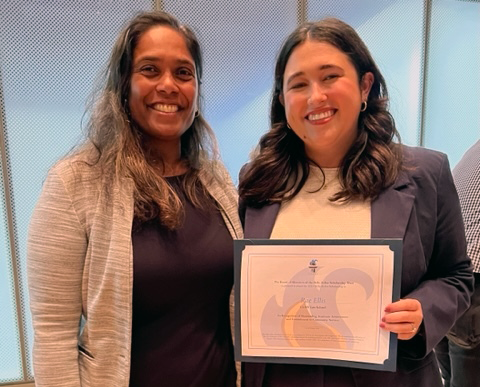
Rae Ellis ’24, right, holds the 2023 Belle Zeller Scholarship Award beside Dean Sudha Setty
It began on her block.
Rae Ellis managed Hollywood talent for years before the 264 feet outside her front door changed everything. She had been bustling to and from LA, to and from her clients, and to and from that door for nearly a decade, before the forced lockdowns in the spring of 2020 penned her in. What began as safe strolls for fresh air and breaks from the monotony and isolation of screens became the first steps of her radicalization: it would be neighbors helping neighbors that got her corner of Brooklyn, and much of New York City, through the pandemic.
Block by block, Rae went deeper into her community. As she became what she describes as an “active participant” in its connections, local businesses, and communal spaces, she recognized that her skillsets of project management, communication, negotiation, and advocacy could be put to use there.
“What I really wanted to do was to see what I could get done with my own network of people, my own social media, even my own Venmo account.” Rae smiles in her recounting. “It was really personal and meant to be a one-time thing: bags of hygiene kits for people who were experiencing houselessness or displacement during that time…socks, hand sanitizer, and soap became a life or death matter.”
In one weekend, she raised upwards of $4,000. She assembled friends to build kits—hygiene kits but also period kits and mother kits with diapers and wipes. Rae and volunteers arranged to drop the kits at shelters throughout the city.
But after having spent so much connecting with folks looking for resources or in need of connection in her own neighborhood, dropping off kits to sit in a box or a drawer wasn’t enough. Was it mutual aid work if it lacked the reciprocity of the exchange? Rae didn’t think so.
So North Brooklyn Care Kits (NBCK) was brought forth into the borough, as well as all the neighborhoods its volunteers passed through on buses, subways, and bike rides. Rae’s efforts went beyond the small bags to center on volunteer training that underscores the importance of striking up conversations to create solidarity where others stopped at charity.
“All the systems that were supposed to be taking care of us were failing us, but the people distributing kits could see if someone needed a hot meal, a new pair of shoes, or someone to watch their stuff as they went for an interview.” Rae notes that volunteers are trained in harm reduction, administering NARCAN, and how to see the human at the center of the need first.
It was this work that led her to apply to CUNY Law in the fall of 2020. She enrolled as a part-time student, but recently made the switch to a full-time schedule and plans to graduate this spring. Currently working in the Disability & Aging Justice Clinic, she continues to power NBCK, with help from volunteers and others she has brought on, in her free time.
This year, she was awarded the Belle Zeller Scholarship, which honors the founding president of CUNY’s Professional Staff Congress and Professor Emerita of Political Science at Brooklyn College. A prestigious honor, since its creation in 1979, the Scholarship celebrates social commitment and academic scholarship and provides funds to the recipient in support of their pursuits as a CUNY student. It’s clear that both her work and her vision honor Zeller’s legacy.
As for what’s next, Rae is looking forward to bringing her CUNY Law experience and education to the next chapter of her mutual aid work. She can see herself as a generalist attorney able to make connections across civil practice areas, from housing and benefits issues to advice for families and immigrants, and more. “I’m struck by this principle that’s about not centering yourself as the lawyer,” she shares. “It’s tempting to think that legal strategies are the best ways to affect change and make the impact we want, and we care about. It’s important to remember that change doesn’t come from the law. We can work within the law and advocate to change the law, but change comes from people.”
